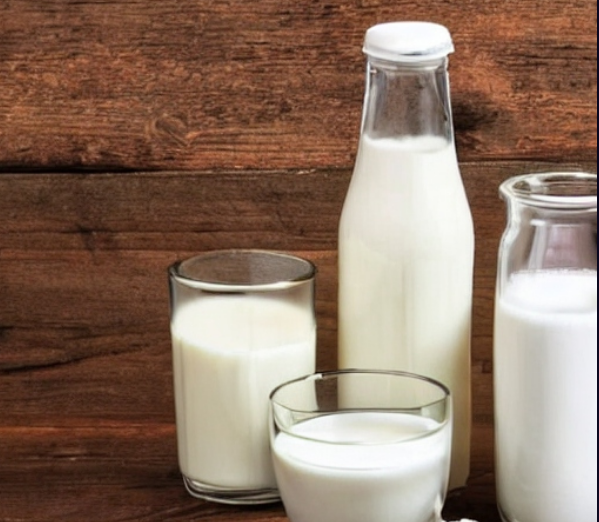Milk is a rich source of several essential nutrients vital for human health, including calcium, protein, and vitamins. However, as with many foods, consuming Milk in excess can lead to some adverse health effects. In this article, we will explore the impact of excessive milk consumption on your health and discuss some tips for determining the right amount of milk to suit your needs.
Excessive Milk consumption can increase the risk of certain health issues, such as digestive problems, acne, weight gain, and even some types of cancer. It can also affect iron absorption in the body. There fore, it is crucial to be aware of these potential effects and consume Milk in moderation as part of a healthy and balanced diet.

Health Benefits of Milk
The numerous health benefits of milk are undeniable. It is a rich source of essential nutrients that play a vital role in maintaining overall health. Here are some of the prominent health benefits of milk:
- Stronger Bones and Teeth: Milk is an excellent source of calcium, a crucial element for bone and teeth health. Calcium contributes to building strong bones and maintaining their density, reducing the risk of osteoporosis and fractures.
- Muscle Building and Growth Promotion: Milk contains a high amount of high-quality protein, which plays a vital role in building and repairing muscle tissues. Protein also contributes to growth and development, especially in children and adolescents.
- Improved Heart Health: Milk contains potassium, which can help regulate blood pressure and maintain heart health. Additionally, some studies suggest that milk may contribute to lowering levels of bad cholesterol (LDL) in the blood.
- Enhanced Digestive Health: Milk contains probiotics, which are beneficial bacteria that live in the gut and contribute to improving digestive health. Probiotics aid in digestion, reduce inflammation, and promote nutrient absorption.
- Improved Skin Health: Milk contains vitamin A, which plays a significant role in maintaining healthy skin. Milk also contains lactic acid, which can help exfoliate the skin and improve its texture.
Considering these numerous health benefits, it is evident that milk can be a valuable addition to a healthy and balanced diet.
Adverse Effects of Excessive Milk Consumption
Despite the health benefits of milk, excessive consumption can lead to some adverse health effects. Here are some potential effects:
- Digestive Problems: Some individuals experience difficulty digesting lactose, the sugar found in milk. Consuming milk in excess can lead to symptoms like bloating, gas, and diarrhea.
- Acne: Some studies suggest that excessive milk consumption may be linked to an increased risk of acne. This could be due to the impact of hormones found in milk on sebum production in the skin.
- Weight Gain: Milk contains calories, and excessive consumption can contribute to weight gain, especially if one consumes whole milk.
- Certain Types of Cancer: Some studies suggest that excessive milk consumption may be associated with an increased risk of certain cancers, such as prostate and ovarian cancer. However, research is still ongoing to confirm this link.
- Iron Absorption: Calcium in milk can affect iron absorption in the body. Therefore, individuals with iron deficiency may need to limit their milk consumption or take iron supplements.
It is important to note that these adverse effects are not common to all individuals and depend on several factors, including genetics, overall health, and the amount of milk consumed. However, it is crucial to be aware of these potential effects and consume milk in moderation.
The Right Amount
The appropriate amount of milk varies from person to person, depending on factors such as age, sex, physical activity level, and overall health. Generally, dietary guidelines recommend consuming two to three servings of dairy products daily for adults. One serving of milk is equivalent to one cup (240 ml).
- Children: Children need higher amounts of calcium for building their bones and teeth. Dietary guidelines recommend that children aged 2-8 years consume two to two and a half cups of milk daily.
- Teenagers: Teenagers also require higher amounts of calcium to support rapid bone growth. Dietary guidelines recommend that teenagers aged 9-18 years consume three cups of milk daily.
- Adults: Adults need less calcium compared to children and teenagers. However, calcium remains important for maintaining bone and teeth health. Dietary guidelines recommend that adults aged 19-50 years consume two to three cups of milk daily.
- Older Adults: Older adults need higher amounts of calcium compared to younger adults to reduce the risk of osteoporosis. Dietary guidelines recommend that older adults over 50 years consume three cups of milk daily.
It is important to talk to your doctor or a nutritionist to determine the appropriate amount of milk that suits your specific needs.
Tips for Determining the Right Amount of Milk
Here are some tips for determining the right amount of milk for your needs:
- Listen to your body: If you experience digestive problems after consuming milk, you may need to reduce the amount you consume or avoid it altogether.
- Choose low-fat or skim milk: Whole milk is high in saturated fat, which can increase the risk of heart disease.
- Consume milk as part of a healthy and balanced diet: Do not rely on milk as your sole source of calcium. You can obtain calcium from other sources such as dark leafy green vegetables, nuts, and seeds.
- If you are lactose intolerant: Choose lactose-free milk or take lactase enzyme supplements.
- Talk to your doctor or a nutritionist: They can help determine the appropriate amount of milk that suits your specific needs.
Conclusion
By following these tips, you can enjoy the benefits of milk while minimizing the risk of potential adverse effects.




GIPHY App Key not set. Please check settings